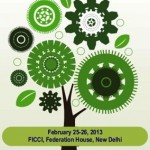 New Delhi – Mr. Yvo de Boer, Former Executive Secretary, UNFCCC and KPMG Global Chairman, Climate Change & Sustainability Service, emphasized on February 4 that policy makers need to deliver the right policy framework for action and countries should formulate their own climate and sustainability targets through a process of debate and public scrutiny. Business leaders need to do a better job of communicating to investors and explain them why sustainable businesses are a better long-term investment bet. For business leaders, sustainability is a matter of risk and opportunity in three key areas – innovation, cost and brand.
New Delhi – Mr. Yvo de Boer, Former Executive Secretary, UNFCCC and KPMG Global Chairman, Climate Change & Sustainability Service, emphasized on February 4 that policy makers need to deliver the right policy framework for action and countries should formulate their own climate and sustainability targets through a process of debate and public scrutiny. Business leaders need to do a better job of communicating to investors and explain them why sustainable businesses are a better long-term investment bet. For business leaders, sustainability is a matter of risk and opportunity in three key areas – innovation, cost and brand.
In his keynote address at the third edition of ‘India Sustainability Conclave 2014’ on the theme ‘Balancing Business Goals in a Sustainability Paradigm’ organized by Federation of Indian Chambers of Commerce and Industry (FICCI), Mr. Boer said that a new business model, True Value, is needed. Explaining the model, he said, “We need to explore a much broader and longer term sense of what company value actually means and how the system can be evolved to recognize this. It can help business adapt and become fit for purpose in the modern business race. Where growth opportunities are maximized, and new risks are managed intelligently. By monetizing the impact of the company on society and the environment and setting this off against its financial results, we can reveal key areas of business risk and the potential impact on future profitability. We are seeing a growing business understanding of Future Value that is broader than the share price and quarterly financial performance and there is still work to be done to develop the tools and to make them standard practice.”
Mr. Boer said, “I believe there is no solution to our sustainability challenges without a central role for business. However, the businesses that succeed will be those that innovate, invest and create long-term value. This notion of value is crucial. The ability of a company to create financial value is important. But what about the value that a company creates for people and the planet through its operations, and the goods and services it delivers? We need to explore a much broader and longer term sense of what company value actually means and how the system can be evolved to recognize this.”
He further deliberated on three perspectives, namely policy, business and investors associated with sustainability. KPMG identified 10 social and environmental mega forces in their report “Expect the Unexpected”, which were soaring global population, exploding middle class with new spending power in developing countries (including India), shift of population from rural areas to cities. Together, these mega forces are now driving the others such as increased demand for energy, increased competition for water supplies, food security issues, pressures on material resources, a warming climate, loss of forests and decline of ecosystems. India is arguably one of the most exposed countries to the effects of the mega forces. In India and elsewhere, mega forces are taking us to economic, social and ecological disaster, unless a dramatic and potentially disruptive change of course can be engineered. Therefore, these three groups need to work together.
A FICCI-KPMG knowledge paper on ‘Corporate Sustainability: Drivers and Enablers’ was released. The paper would provide a good reference point for the discussion on corporate sustainability as it stands today.

Dr. Jyotsna Suri, Senior Vice President, FICCI, said, “Various regulatory and voluntary measures are aiding corporate sector in the shift towards a new business paradigm encompassing sustainability. While many large businesses have realized the sustainability imperative, the challenge lies in enabling the small and medium enterprises to move to a sustainability paradigm. Though the context for making a transition to a sustainability paradigm will remain the same for large as well as small and medium companies, the approach will differ in the case of SMEs who need greater handholding, common infrastructure support, concessional finance, and larger capacity building.”
Dr. Prodipto Ghosh, Chairman, FICCI Climate Change Task Force and & Former Secretary, Ministry of Environment and Forests, said that there are three different aspects of corporate sustainability in the Indian context – regulatory regime, CSR and profit making opportunities from investment in sustainability.
Speaking about regulatory regime, he said, some of the issues that must be addressed were need for capacity for preparing robust and rigorous environmental impact assessments (EIAs), accessing data is difficult from government agencies as there is no portal wherein project proponents can access environmental data and need for greater accountability as cases of lack of oversight within the ministry and at the political level has been witnessed.














